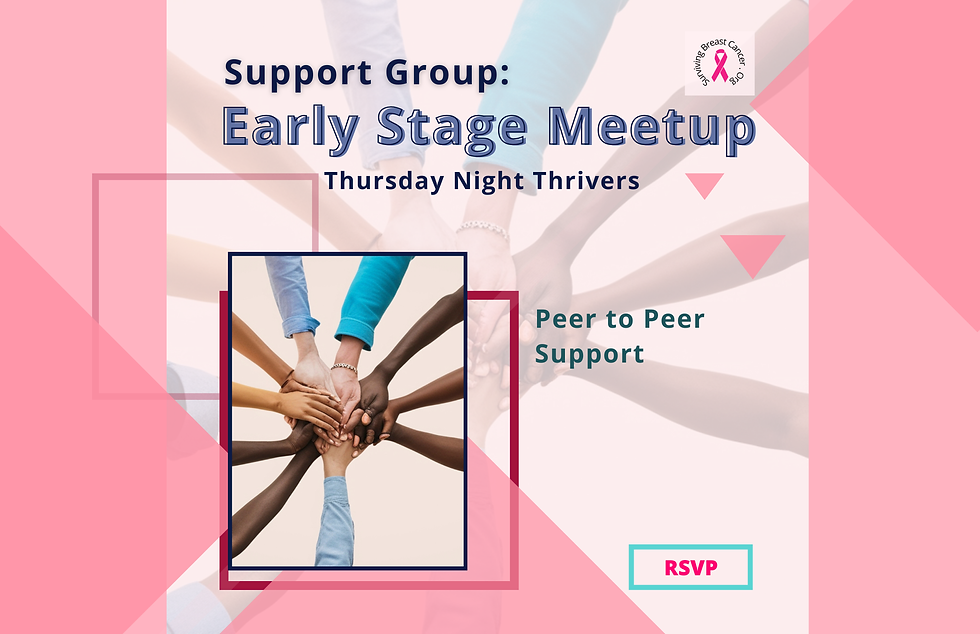Breast Cancer and Sugar
- Laura Carfang, Ed.D.

- Aug 7, 2022
- 3 min read
Updated: Oct 29, 2025

There have been, and continue to be, numerous studies that attempt to link the consumption of sugar to breast and other cancer(s). These myriad studies have investigated whether sugar ingestion contributes to breast cancer or further stimulates its growth. So, the question of whether or not sugar contributes to or feeds breast cancer cells remains unresolved at this time.
Sugar's Role in the Body
Physiologically speaking, our cells need energy to develop and survive. Similarly, so do cancer cells, which typically grow fast and therefore require even more energy to do so. But, where does all this energy come from?
Our bodies’ energy comes from several sources, including glucose, which is found in sugary foods in our diet, but especially from foods containing carbohydrates that are converted into glucose. Glucose is a simple sugar or monosaccharide, is a component found in many carbohydrates, and remains our body’s favorite energy source. Note: Scientifically speaking, sugars are categorized as monosaccharides or disaccharides. Disaccharides are made up of two linked monosaccharides (simple sugars), which are then broken back down into the latter during digestion.
Types of Sugar and Where They Come From
Is glucose good or bad for you? What about fructose, sucrose, dextrose, etc.? Fructose is known as the fruit sugar, and like glucose, is a simple sugar. Fructose is naturally found in fruit and most root vegetables. However, fructose is commonly added to processed foods in the form of high-fructose corn syrup, which is derived from sugar cane, sugar beets, and corn.
Sucrose (more commonly known as table sugar) is a disaccharide consisting of glucose and fructose. It’s a naturally occurring carbohydrate found in many fruits, vegetables, and grains, but it’s also added to many processed foods, such as candy, ice cream, breakfast cereals, canned foods, soda, etc. Sucrose found in processed foods is commonly derived from sugar cane or sugar beets.
Glucose, fructose, and sucrose are found naturally in many foods but are also added to processed foods. However, they are digested and absorbed differently (i.e., our bodies digest and absorb monosaccharides and disaccharides differently). As mentioned, monosaccharides are already in their simplest form; therefore, they don’t need to be broken down before our bodies can use them. They’re absorbed directly into our bloodstream, primarily through the small intestine. On the other hand, disaccharides like sucrose must be broken down into simple sugars before they can be absorbed.
Does Sugar Increase Breast Cancer Risk?
According to a recent study by The University of Texas MD Anderson Cancer Center, Rolaynne Kimmons posits, “High amounts of dietary sugar in the typical Western diet may increase the risk of breast cancer and metastasis to the lungs.”
Another study looked at the “intersection of obesity, cardiovascular disease, and breast cancer,” while Megan Rosessler from the Mayo Clinic suggests that "sugar seems to be a major source of anxiety and fear for people with cancer. There is a myth circulating that sugar feeds cancer and that avoiding sugar will prevent the growth of cancer. To set things straight, sugar does not cause cancer on its own. Giving sugar to cancer cells does not make them grow faster, and depriving cancer cells of sugar does not make them grow more slowly. However, sugar may be indirectly involved in the development of cancer.”
These and other studies make it seem possible that if you had no sugar in your diet, it could help stop cancer from developing or growing. But all our other cells also need glucose to survive, and there’s no way of letting just the healthy cells get the amount of glucose they need while starving the cancer cells.
What You Can Do to Decrease Your Risk
Perhaps the most important prescription for cancer patients is to limit the amount of sugar in their diet, read ingredient labels, enjoy simple, unprocessed foods, and follow the advice of your nutritionist/oncology team to focus on getting the nutrients they need to stay strong during and after treatment. In short, eat the healthy sugars found in fruits and veggies while shying away from the cookies, cakes, and processed cereals.
While the possible link between sugar and cancer is often discussed, the research so far has not shown evidence of a direct link, but that research continues.











